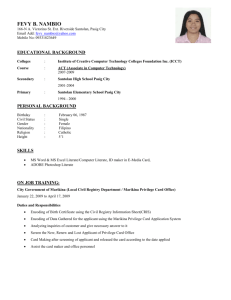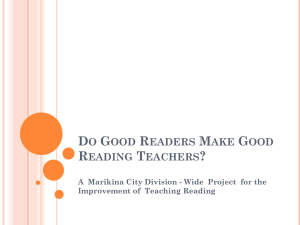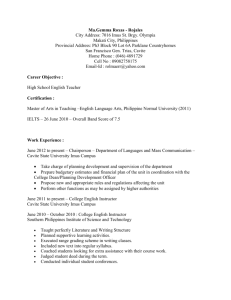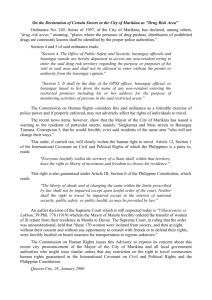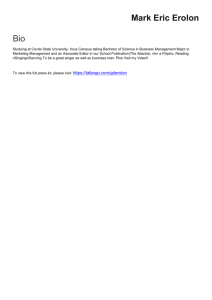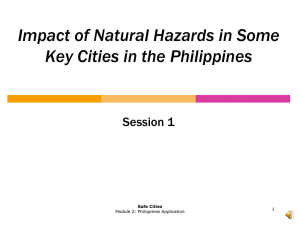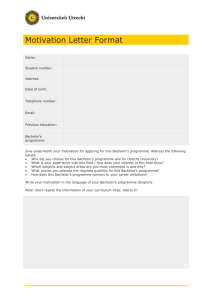5. Frederick V. Rael
advertisement
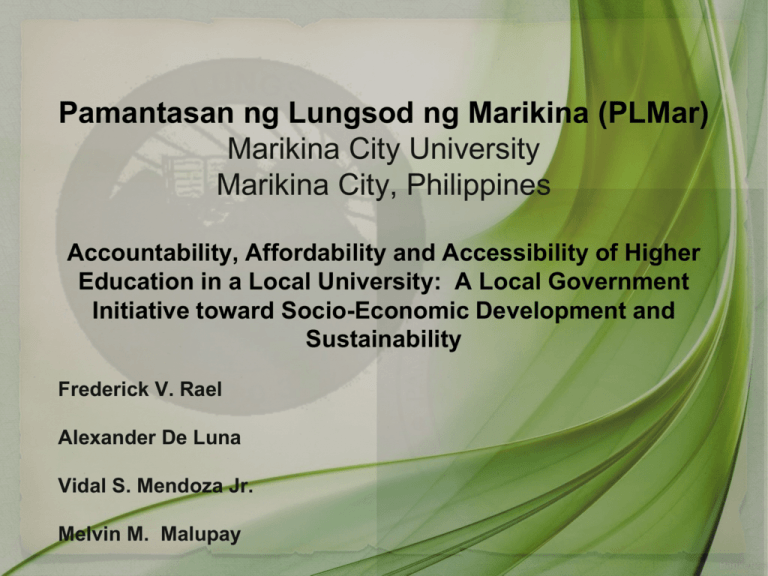
Pamantasan ng Lungsod ng Marikina (PLMar) Marikina City University Marikina City, Philippines Accountability, Affordability and Accessibility of Higher Education in a Local University: A Local Government Initiative toward Socio-Economic Development and Sustainability Frederick V. Rael Alexander De Luna Vidal S. Mendoza Jr. Melvin M. Malupay PROFILE OF THE RESEARCHERS Prof. Frederick V. Rael Department Head of the Social Sciences and Social Work at the Pamantasan ng Lungsod ng Marikina (PLMar) He is a graduate of BS Sociology and MA in Educational Management. He has also completed his academic requirements in the MA in Sociology and presently pursuing his MA in Education major in Social Sciences. Professionally, he has been teaching for almost 15 years in several colleges and universities in the Philippines. Aside from teaching, he is also an online writer and a researcher. He has been writing for various online writing agencies for 6 years and has produced three books (Introduction to Sociology, Module in Good Governance and Social Responsibility, and Module in Total Quality Management).He has contributed in the PLMar Research Journal Punla Volume II and PLMar Research Journal Budyungan Volume II. In addition, he is an advocate of workers’ rights through his membership in a labor group. Prof. Alexander De Luna is currently the Program Head of Public Administration in Pamantasan ng Lungsod ng Marikina (PLMar). He is a graduate of Master in Public Administration and a former Civil Society Organization (CSO) in Marikina Philippines for 3 years. Aside from teaching, he is an advocate for Youth Leadership and Empowerment and founder of several community and youth organizations and a consultant of several elected public officials in Marikina in the area of legislation and program implementation. He is also a speaker in organizational management and community organizing for several local government units, national organizations, and different local and sectoral organizations in the last 10 years in the Philippines. PROFILE OF THE RESEARCHERS Prof. Vidal S. Mendoza Jr. is the present Dean of College of Arts and Sciences at the Pamantasan ng Lungsod ng Marikina (PLMar). He graduated AB in Filipinology under the Mass Communication and MA in Filipino. He has been teaching various subjects that are pertinent to languages (Filipino and Nihongo), literatures, and Filipino culture. With his advocacy in promoting the Filipino language and culture, he has occupied vital and leadership positions in several civic and academic organizations particularly Master of Arts in Filipino Society, DAMLAY_Philippines, CLL Alumni Association, ABF Alumni Association, Philippine Society of Young Educators of Languages and the Arts, Inc, and Knights of Rizal. Through his dedication and talents as a young educator, he had been given recognitions such as “Pride of the Nation of Candaba,” and a finalist in the “Ten Outstanding Young Employees of the Philippines o TOYEP 2013. He is also a co-author in many books in Filipino like "Komunikasyon sa Akademikong Filipino", Pagbasa at Pagsulat Tungo sa Pananaliksik at "Retorika at Masining na Pagpapahayag", and “Muhon: Sining at Kasaysayan ng Panitikan ng Pilipinas. Professor Melvin M. Malupay is a dynamic college instructor with over 11 successive years of experience in teaching and management of students in Higher Educational Institution. He is currently a Full-Time faculty of the College of Arts and Sciences teaching Public Administration and Social Sciences courses. He professed several researches in the field of Public Administration, Social Sciences and Education. He also co-authored and served as a reviewer of Social Sciences textbook and had created several E-learning modules of same discipline. He finished AB Political Science and Master in Public Administration. He once held positions like Outreach Coordinator and Focal Person/Coordinator in Research and Extension Directorate. Profile of the University • The Pamantasan ng Lungsod ng Marikina (simply known as PLMar or Marikina City University) is the first city government-funded university in Marikina City, Philippines. It was established to provide quality but affordable tertiary education to the residence of Marikina by Ordinance No.015 Series of 2003. • Enrollment in 2003 was 1,424 students and has successively increased, now almost 8,000. PLMar surpasses the national rate of graduates who pass the professional, Regulation Commission National Board Examinations for Nurses, Teachers, and Criminology. • PLMar has a commitment to produce work-ready, career-focused, and community-oriented graduates, and has been successful in developing globally competitive graduates that are employed internationally. • It is guided by its core values are discipline, excellence, and good taste. • The present leadership is headed by Mayor Del R. De Guzman, and with karunungan one of the 7-k flagship programs of his administration, PLMar gears its programs toward their achievement and hope to maintain Marikina as a vibrant community of citizens, proud of their roots and have a mutual concern for the common good. Mayor Del De Guzman Vice Mayor Fabian Cadiz Counselor Sam Ferriol Courses Offered A. Short Courses • Associate in Hotel and Restaurant Services (ladderized) 1 year Caregiver NC II B. Four-year Programs • Bachelor of Elementary Education • Bachelor of Special Education (SPED) • Bachelor of Secondary Education major in Filipino, English, Mathematics • Bachelor of Arts in Mass Communications • Bachelor of Science in Business Administration, major in Marketing Management, Financial Management, Human Resource Development management, and Entrepreneurial Management • Bachelor of Science in Criminology • Bachelor of Science in Hotel and Restaurant Management • Bachelor of Science in Nursing • Bachelor of Science in Human Kinetics • Bachelor of Science in Tourism Management • Bachelor of Science in Information Technology • Bachelor of Secondary Education • Bachelor of Science in Psychology • Bachelor of Arts in Mass Communications C. Five-year Programs • Bachelor of Science in Accountancy D. Graduate Programs • Master of Arts in Education, major in Educational Management • Master in Business Administration (Special Management Program) • Master of Arts in Educational Management • Master of Education (Non-Thesis) • Master in Business Administration • Doctor in Public Administration • Doctor of Philosophy in Business Administration BACKGROUND It is a universally accepted and highly regarded expectation that all societies particularly in the developing countries should provide the necessary social services for the welfare of its citizens. One basic social service that a government of the state, country, or nation should undertake is the provision of quality education. Quality education is essential for creating a sustainable human resource base upon which to build the development of any country (Lohani,2012). However, the onset of the 21st century poses insecurities and instabilities to every society anywhere in the world, due to a growing need of skilled workforce in all fields of disciplines. This perspective is re-affirmed by the thoughts of Devesh (2008) as cited by Tham (2011) that this increasing demand for higher education across the globe particularly from the youth population of the developing countries is an important pathway for greater social mobility. Education and its Constitutional Basis in the Phil. Context Filipinos have deep regard for education. As such, education occupies a central place in Philippine political, economic, social, and cultural life. It has always been strongly viewed as a pillar of national development and a primary avenue for social and economic mobility. According to the United Nations (2008) report, a clear evidence of the Filipino value placed on education is the proportion of the national government budget going to the sector. The Department of Education (DepEd), known as the Philippines’biggest bureaucracy is given the highest budget allocation among government agencies each year as mandated by the Likewise, the same Philippine Constitution 1987 Philippine Constitution (Article XlV, Sec.5 paragraph 5), guarantees the right to education of every Filipino. It provided that ‘The State shall protect and promote the right of all citizens to quality education at all levels and shall take appropriate steps to make education accessible to all.’ Supporting Laws • Republic Act No. 9155 known as the Governance of Basic Education Act of 2001. • Republic Act No. 6655 or the Free Secondary Education Act, (to protect and promote the rights of all Filipinos by providing children free and compulsory education in the elementary and secondary levels. This refers to 6 years of free tuition fees for children aged 6 – 11 years old, and free four years of secondary schooling for those aged 12 to 15 years old.) Prevailing Issues and Concerns Despite the preceding legal mechanisms, budget prioritization and increased access, Philippine education has been dogged with issues. All the more, government effort to provide affordable tertiary education is seen as lagging behind. Currently, the Phil. Education is encountering: • Rising costs of higher education making college education unaffordable for many students and their families. • The persistent state budget constraints have limited funding for public colleges. These conditions led to the existing reality in Public Education in the Phils.,” that state funding for all public colleges decreased, while tuition fee rises. Local Government Efforts in Making College Education Affordable and Accessible In an effort to curtail the rising cost of tertiary education, local institutions are constantly making conscious effort to establish tertiary education accessible to its constituents. The Local Government provides assistance to students through loans, grants, and work study programs. These strategies enable the state to play a key role in promoting affordability in higher education in that they provide a significant amount of financial support to public colleges and universities. Following the concepts provided by Usher and Medow (2010), access to higher education is the ability of people from all backgrounds to access higher education on a reasonably equal basis. This is in fact the issue that confronts all governments throughout the world. OBJECTIVES The primary objective of this inquiry is to estimate affordability and accessibility of higher education offered in the City University for students and their families. This seeks to provide more objective information for both policymakers and other stakeholders. Likewise, the analysis enables us to better understand the impact of student assistance policies for increased enrolment. This very issue inspired the researchers to venture on this study to ascertain that the efforts of the city government of Marikina to create a local university is a well – meant strategy in providing affordable and accessible tertiary educational service to its constituencies as a token of assuming its public accountability. These are important goals but unfortunately, the same issues are rarely studied systematically or rigorously PROBLEM STATEMENT Specifically, this study attempted to answer the following question: 1.) What affordability indicator/s can be used to define the affordability and accessibility level of higher education offered by the City University? 2.) What is the cost of higher education offered at the City University? 3.) What other strategies can be adopted by the city government to enhance the affordability and accessibility of higher education in the City University? Methodology To examine the affordability and accessibility of higher education in this local university in Marikina City, an acceptable range of indicators as identified by Usher and Medow (2010) was used. According to these authors, there are four possible types of indicators that can be used to determine the affordability of education, namely: 1.) Costs as a fraction of ability to pay (ATP). These are relatively easy to measure. It encompasses tuition including all mandatory fees, education costs (tuition plus books and materials), Living expenses (room and board), and total coasts (education coasts, plus living expenses). All these can be expressed as a function of an ATP measure. 2.) Support/ATP are various forms of government support should be included in any calculation of affordability. One way of doing so is measuring Grants, Loans, and Tax expenditures per student; all of which can all be expressed as a fraction of ATP; 3.).Support/Costs is another way to achieve affordability by measuring government support as a fraction of the costs student face. 4.) Cost minus support/ATP – a final way of measuring affordability is to calculate various forms of net costs (cost minus subsidies) or out – of – pocket costs (cost minus all government assistance) as a fraction of ATP. Any of these measures are reasonable potential measures of affordability and choosing between them is necessarily normative exercise. Results and Discussion Table 1 Total Cost of College Education at the Marikina City University Books, uniforms and other school needs School Year 2003 - 2004 Total Cost of Education Php 2,750.00 2004 – 2005 - do - 2005 - 2006 - do - 2006 - 2007 Subsidized by City Government officials and other government agencies - do -do- Php 3,250.00 -do - 2007 – 2008 - do - 2008 – 2009 - do - 2009 – 2010 - do - - do - 2010 – 2011 - do - - do - 2011 – 2012 - do - - do- 2012 – 2013 - do - - do 2013 – 2014 -do -do - Php 4, 250.00 2014 – 2015 - do - 2015 – 2016 - do - -do - do -do- Table 2 Data on Financial Assistance per Government Agency Government Number of Recipients Agency/Program College Education Assistance Program 800 students Marikina 800 students Congressional Financial Assistance (District 1) Marikina 800 students Congressional Financial Assistance (District 2) DOLE Special Program 160 students for the Education of Students Department of Social Number of recipients Welfare and vary according to Development indigence Former Government 1 student/government Officials official Amount of Subsidy Php2,500.00/student Php2,000.00/student Php2,000.00/student 100% Tuition fee subsidy Php1,000.00 – 2,000.00/family 100% Tuition fee subsidy Analysis and Interpretations • Table 2 above summarizes the financial assistance provided by the City Government to sustain the affordability of higher education in the City University. Added to the financial assistance are the various scholarship awarded to deserving students based on their academic performance • As regard the accessibility of education in the City University, the participation rate is that 65% of the youths in Marikina City seek admission to college education offered by the City University. The 35% of those students who graduated from same secondary schools and year of graduation decided to enrol in other higher education institutions in the National Capital Region. As regard attainment rate, data from the University Registrar supports that the attainment rate of students in this City University is between 55% - 60%. It can be observed that dropout rate in this City University is very low and majority of the students finished their degree program on time as prescribed by the City University policy, stipulated in the policy of the Commission on Higher Education (CHED). Majority of the students usually finish their program of study in four years as prescribed by the Commission on Higher Education. • On issue of Educational Equity Index (EEI), the socio – economic background of 80% of parents whose son/daughter is attending City University are those belonging to the working class such as construction workers, tricycle drivers, taxi drivers, jeepney drivers, vendors, helpers (domestic), manicurists, sales clerks, and some with some unfinished college degree. The composition of the student body as a whole is dominated by children from the working class. • On the issue of Gender Parity Index (GPI), it showed that there is a slight difference between the male and female student – attendees. Female students are slightly higher in numbers than their male counter parts. Conclusion • It can be concluded that the over-all accessibility level of the higher education in the City University of Marikina can be described as highly accessible as shown by the preceding discussion. • Furthermore, higher education provided by the City University of Marikina is affordable and accessible to all constituents of the city. Based on the findings, the following strategies maybe adopted by the City Government of Marikina to enhance the affordability and accessibility of higher education in the City University: 1. Student loans program for students who belong to the poorest of the poor is highly recommended to enhance the financial assistance schemes of the City University. 2. There should be a financial assistance program to encourage students to enroll in courses that are in-demand or with board exams. 3. Work Study program is also a viable strategy for alleviating the condition of the poor students in the City. References Asian Development Bank (2012). Access without Equity? Finding a Better Balance in Higher Education in Asia. Devesh, K. (2008). Higher Education in Developing Countries. Paper presented at the Second Annual GDI Forum. Ejere. Emmanuel S. I. (2012). Promoting Accountability in Public Sector Management in Today Democratic Nigeria Murakami, Yuki and Blom, Andreas (2008). Accessibility and Affordability of Tertiary Education in Brazil, Colombia, Mexico and Peru within the Global Context. The World American and Caribbean Region Human Development Sector. Bank. Latin OECD Observer (2008). Ten Steps to Equity in Education. Policy Brief Philippine Education for All 2015: Implementation and Challenges (2015). Shadreck, Mandina and Herbert, Chiheve (2013). ‘Quality and Accountability in Education: What Say the School Heads. Educational Research International, Volume 2, No 2. Tham, Siew Yean (2011). Exploring Access and Equity im Malaysian Private Higher Education. ADBI Working Paper No. 280, ADB Institute. United States Government Accountability Office (2014). Higher Education: State Funding Trends and Policies on Affordability. Report to the Chairman, Committee on Health, Education, Labor, and Pensions, United State Senate. Universities Australia (2013). An Agenda for Australian Higher Education 2013 – 2016: A Smarter Australia. Creative Commons Attribution. Usher, Alex and Medow, Jon (2010). Global Higher Education Rankings: Affordability and Accessibility in Comparative Perspective. Higher Education Strategy Associates. Marcucci, Pamela and Usher, Alex (2012). 2011 Year in Review: Global changes in Tuition Fee Policies and Student Assistance Retrieved http://higheredstrategy.com/wp- THANK YOU…
